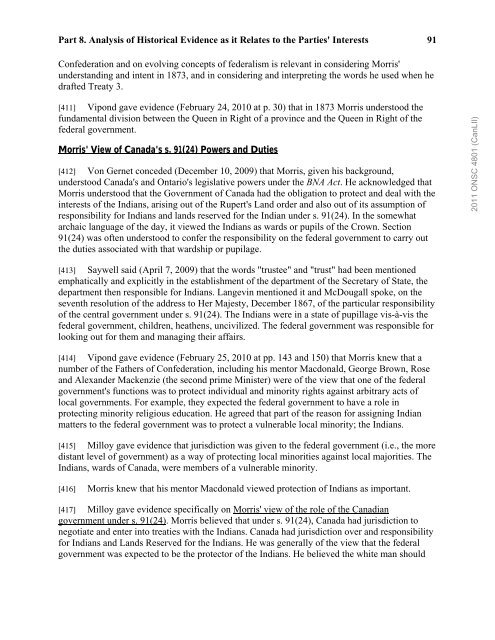Keewatin v. Minister of Natural Resources
Keewatin v. Minister of Natural Resources
Keewatin v. Minister of Natural Resources
- No tags were found...
You also want an ePaper? Increase the reach of your titles
YUMPU automatically turns print PDFs into web optimized ePapers that Google loves.
Part 8. Analysis <strong>of</strong> Historical Evidence as it Relates to the Parties' Interests 91Confederation and on evolving concepts <strong>of</strong> federalism is relevant in considering Morris'understanding and intent in 1873, and in considering and interpreting the words he used when hedrafted Treaty 3.[411] Vipond gave evidence (February 24, 2010 at p. 30) that in 1873 Morris understood thefundamental division between the Queen in Right <strong>of</strong> a province and the Queen in Right <strong>of</strong> thefederal government.Morris' View <strong>of</strong> Canada's s. 91(24) Powers and Duties[412] Von Gernet conceded (December 10, 2009) that Morris, given his background,understood Canada's and Ontario's legislative powers under the BNA Act. He acknowledged thatMorris understood that the Government <strong>of</strong> Canada had the obligation to protect and deal with theinterests <strong>of</strong> the Indians, arising out <strong>of</strong> the Rupert's Land order and also out <strong>of</strong> its assumption <strong>of</strong>responsibility for Indians and lands reserved for the Indian under s. 91(24). In the somewhatarchaic language <strong>of</strong> the day, it viewed the Indians as wards or pupils <strong>of</strong> the Crown. Section91(24) was <strong>of</strong>ten understood to confer the responsibility on the federal government to carry outthe duties associated with that wardship or pupilage.2011 ONSC 4801 (CanLII)[413] Saywell said (April 7, 2009) that the words "trustee" and "trust" had been mentionedemphatically and explicitly in the establishment <strong>of</strong> the department <strong>of</strong> the Secretary <strong>of</strong> State, thedepartment then responsible for Indians. Langevin mentioned it and McDougall spoke, on theseventh resolution <strong>of</strong> the address to Her Majesty, December 1867, <strong>of</strong> the particular responsibility<strong>of</strong> the central government under s. 91(24). The Indians were in a state <strong>of</strong> pupillage vis-à-vis thefederal government, children, heathens, uncivilized. The federal government was responsible forlooking out for them and managing their affairs.[414] Vipond gave evidence (February 25, 2010 at pp. 143 and 150) that Morris knew that anumber <strong>of</strong> the Fathers <strong>of</strong> Confederation, including his mentor Macdonald, George Brown, Roseand Alexander Mackenzie (the second prime <strong>Minister</strong>) were <strong>of</strong> the view that one <strong>of</strong> the federalgovernment's functions was to protect individual and minority rights against arbitrary acts <strong>of</strong>local governments. For example, they expected the federal government to have a role inprotecting minority religious education. He agreed that part <strong>of</strong> the reason for assigning Indianmatters to the federal government was to protect a vulnerable local minority; the Indians.[415] Milloy gave evidence that jurisdiction was given to the federal government (i.e., the moredistant level <strong>of</strong> government) as a way <strong>of</strong> protecting local minorities against local majorities. TheIndians, wards <strong>of</strong> Canada, were members <strong>of</strong> a vulnerable minority.[416] Morris knew that his mentor Macdonald viewed protection <strong>of</strong> Indians as important.[417] Milloy gave evidence specifically on Morris' view <strong>of</strong> the role <strong>of</strong> the Canadiangovernment under s. 91(24). Morris believed that under s. 91(24), Canada had jurisdiction tonegotiate and enter into treaties with the Indians. Canada had jurisdiction over and responsibilityfor Indians and Lands Reserved for the Indians. He was generally <strong>of</strong> the view that the federalgovernment was expected to be the protector <strong>of</strong> the Indians. He believed the white man should
















